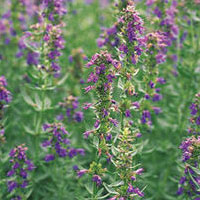Hyssop
 © Martin Wall
© Martin WallHow It Works
Due to the presence of volatile oil constituents in hyssop, it may provide relief for mild irritations of the upper respiratory tract that accompany the common cold. The expectorant action of hyssop’s volatile oil may partially explain its traditional use for coughs, asthma, and bronchitis.4 The volatile oils are also thought to contribute to hyssop’s carminative actions and use for mild cramping and discomfort in the digestive tract. The German Commission E has not approved hyssop for any medical indication.5 Test tube studies have found that certain fractions of hyssop (one being a polysaccharide designated as MAR-10) may inhibit the activity of the human immunodeficiency virus (HIV).6, 7 Yet, there have been no studies in humans to determine whether hyssop or any of its constituents are effective in treating HIV infection or AIDS.
How to Use It
Hyssop may be taken as a tea or tincture. The tea is prepared by infusing 2–3 teaspoons of herb in one cup (250 ml) of hot water for ten to fifteen minutes. Three cups can be drunk per day. Alternatively, 1–4 ml of tincture can be taken three times per day.8 If hyssop is being used to help soothe a sore throat, gargle with the tea or tincture before swallowing. The essential oil should never be used at a level higher than 1–2 drops per day internally, though more can be used topically on unbroken skin. One teaspoon (5 grams) of hyssop herb steeped in 1 cup (250 ml) hot water in a closed vessel for 15–20 minutes, then given in sips from a bottle over a period of 2–3 hours, may help calm colic.
Copyright © 2024 TraceGains, Inc. All rights reserved.
Learn more about TraceGains, the company.
The information presented by TraceGains is for informational purposes only. It is based on scientific studies (human, animal, or in vitro), clinical experience, or traditional usage as cited in each article. The results reported may not necessarily occur in all individuals. Self-treatment is not recommended for life-threatening conditions that require medical treatment under a doctor's care. For many of the conditions discussed, treatment with prescription or over the counter medication is also available. Consult your doctor, practitioner, and/or pharmacist for any health problem and before using any supplements or before making any changes in prescribed medications. Information expires December 2024.
